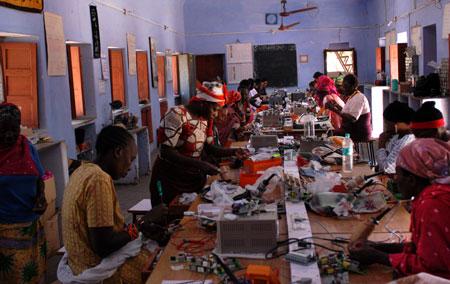One film tests the claim that a child's opportunities in life can largely be predicted at birth. Another tracks the state of the overcrowded Chinese job market, and yet another takes a critical look at the American dream in the 21st century.
These are three of the films by renowned filmmakers taking part in "Why Poverty?", an international project to generate discussion about poverty and the possibilities and challenges of improving life for millions of people around the world.
Create A More Nuanced View
More than 40 broadcasters are backing the project and will be airing the films. The discussion will spread via websites and mobile platforms, while fostering dialogue and activities at universities and schools.
"Our goal is to move the under-standing of poverty. We want to generate discussion about the world’s poorest people, provide insight into the issues and create a backdrop for action," Mette Hoffmann Meyer says. The head of documentaries at Denmark's national broadcaster DR is producing "Why Poverty?" with BBC documentary editor Nick Fraser and the South African producer Don Edkins.
"We want to create a more nuanced view of global poverty and rock the traditional NGO understanding of the global North as donating to the global South. For example, infant mortality among poor people in the US is higher than in some places in Africa," Hoffmann Meyer says
"As public broadcasters, we want to engage people through films that set the agenda and stimulate greater understanding of the challenges we face in the world. A good story can get people out of their chairs emotionally and intellectually."
Top Filmmakers
Steps International was behind "Why Democracy?", a 2007 project of 27 films that reached 250 million people worldwide. The bar is even higher this time: "Why Poverty?" aims to engage 500 million people, when the films start airing in the last week of November 2012.
Hoffmann Meyer is a driving force in the project as one of three executive producers raising the 8 million euros – for production, Internet, promotion, etc. – that it takes for the project to achieve the desired quality and dissemination. A large chunk of the financing is provided by the many broadcasters that this time, in addition to European and American networks, also include Chinese, Korean, Japanese, Malaysian and Brazilian television stations. A number of major charitable foundations have also contributed, including the Bill and Melinda Gates Foundation and the Ford Foundation.
"A well-told film works anywhere in the world," Hoffmann Meyer says."So it's important to use the best story-tellers there are. We opted for directors with some experience to ensure the necessary quality.
"What's more, I think inter- national collaboration broadens the view and brings more authenticity and honesty to the stories. Obviously, a Chinese filmmaker will understand the Chinese school system better than we ever could by researching."
To Forge International Ties
Klara Grunning-Harris, film commissioner at the Danish Film Institute, which is supporting the films, thinks an important element of the project is how it will be creating new connections among documentary filmmakers.
"This is a great opportunity for the Danish film industry, and the Danish Film Institute, to play in the inter-national arena with some of the biggest international actors, like BBC, ZDF, ARTE, NHK," Grunning-Harris says.
"The eight films we are supporting are made by some of the best film- makers working today. We will be part of a big campaign that will generate dialogue and activity around the globe across all platforms, and we are in on the ground floor."
"We make good films in Denmark. We have a strong, aesthetic approach and we aren't afraid to take chances, but the Danish film industry needs to get out in the world and forge direct and lasting ties to production companies and broadcasters," says the DFI film commissioner. Her own background includes years of experience working as a producer in the US.
"When you're from a small country, it can be hard to raise your film to the point where it can break through internationally – making it bigger and broader and more universal. The films in "Why Poverty?" will have budgets on a scale that makes it possible to do grade-A work. We hope they will inspire the industry that way. We hope they will inspire the industry that way."


